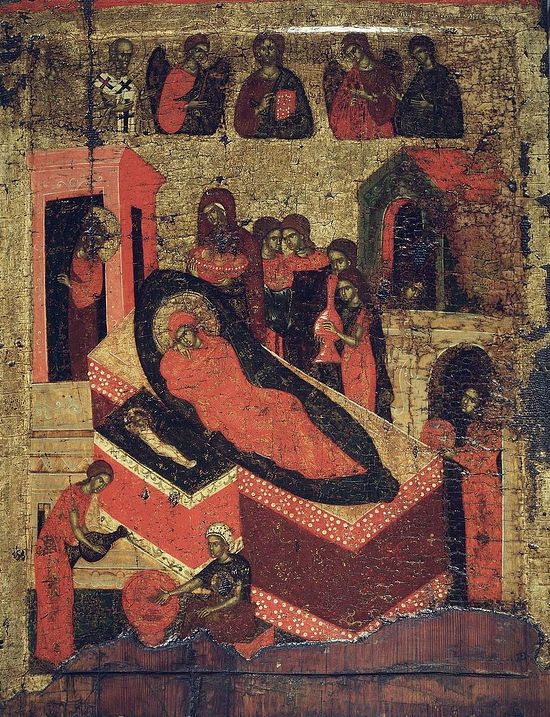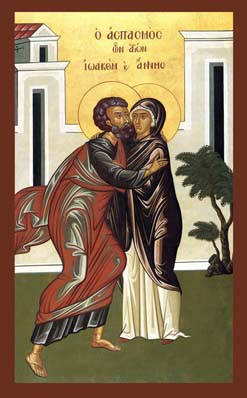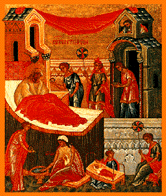 How common it is for us to celebrate the birth and milestones in the life of our friends and those whom we hold dear. We enjoy celebrating their birthday and achievements expressing our camaraderie in their triumphs along their life’s journey, rejoicing when they rejoice. Is this not even more natural for us to do within the Church? There are many saints whom we are drawn to (or, more correctly, they draw us to themselves) and we, therefore, make a point to be aware of the day that their feast is celebrated, take time out to read their life and works, prepare and commune at the Divine Liturgy and honour them recognizing their place in the wider Church as well as in our own lives. Therefore, today is no different, and yet it is, due to the greatness of the one we are celebrating: Mary, the Mother of God.
How common it is for us to celebrate the birth and milestones in the life of our friends and those whom we hold dear. We enjoy celebrating their birthday and achievements expressing our camaraderie in their triumphs along their life’s journey, rejoicing when they rejoice. Is this not even more natural for us to do within the Church? There are many saints whom we are drawn to (or, more correctly, they draw us to themselves) and we, therefore, make a point to be aware of the day that their feast is celebrated, take time out to read their life and works, prepare and commune at the Divine Liturgy and honour them recognizing their place in the wider Church as well as in our own lives. Therefore, today is no different, and yet it is, due to the greatness of the one we are celebrating: Mary, the Mother of God.
The Conception of Saint John the Baptist
October 6 / September 23
On this day the mercy, miracles and wisdom of God are celebrated: His mercy toward the devout and righteous parents of St. John, the aged Zacharias and Elizabeth, who all their lives had wished for and begged a child from God; His miracle, that of John’s conception in the aged womb of Elizabeth; His wisdom, in the dispensation of man’s salvation. God had an especially great intention for John: namely, that he be the Prophet and Fore-runner of Christ the Lord, the Savior of the world. Through His angels, God announced the births of Isaac to the childless Sarah, Samson to the childless wife of Manoah, and John the Forerunner to the childless Zacharias and Elizabeth.
All of these were those for whom He had special intentions, and he foretold their birth through his angels. How could children be born of aged parents? If someone desires to understand this, he should not ask men about it, for men do not know; nor should he study natural law, for this is beyond natural law. Rather, he should turn his gaze upon the power of the Almighty God, Who created the whole world from nothing, and Who needed no parents—old or young—for the creation of the first man, Adam. Instead of being curi- ous, let us give thanks to God, Who often reveals His power, mercy and wisdom to us in ways that are beyond natural law—in which we would be imprisoned without these special miracles of God, and would fall into despair and forgetfulness of God.
Holy Martyrs Faith, Hope and Love and Their Mother Sophia
 In the reign of the Roman Emperor Hadrian (117-138) there lived a widow called Sophia which in Greek means "wisdom". She was a Christian, and in accordance with her name, she lived her life wisely. She had three beautiful daughters whom she called by the names of the three Christian virtues: the first was called Faith, the second Hope, and the youngest Love. She taught her daughters to live in u way pleasing to God by prayer, fasting and helping the poor. As the children grew in age, so also they grew in virtue, being obedient to their mother, They read diligently and knew well the books of the Prophets and Apostles; they were fervent in prayer and house-work. Their beauty combined with their virtuous lives attracted the attention of many.
In the reign of the Roman Emperor Hadrian (117-138) there lived a widow called Sophia which in Greek means "wisdom". She was a Christian, and in accordance with her name, she lived her life wisely. She had three beautiful daughters whom she called by the names of the three Christian virtues: the first was called Faith, the second Hope, and the youngest Love. She taught her daughters to live in u way pleasing to God by prayer, fasting and helping the poor. As the children grew in age, so also they grew in virtue, being obedient to their mother, They read diligently and knew well the books of the Prophets and Apostles; they were fervent in prayer and house-work. Their beauty combined with their virtuous lives attracted the attention of many.
Sermon for the Nativity of the Theotokos
Sts Joachim and Anna, parents of Blessed Mary (Theotokos)
 So much attention is paid by Christians to the Blessed Virgin Mary, the Theotokos, sanctified in every conceivable way, that there is a tendency to overlook her parents. Commemorated the day after the commemoration of their daughter, who is remembered on other days as well, Joachim and Anna were the parents of a flesh-and-blood human being they called Mary and, therefore, the grandparents of a flesh-and-blood human being, in form at least, who died to save the world.
So much attention is paid by Christians to the Blessed Virgin Mary, the Theotokos, sanctified in every conceivable way, that there is a tendency to overlook her parents. Commemorated the day after the commemoration of their daughter, who is remembered on other days as well, Joachim and Anna were the parents of a flesh-and-blood human being they called Mary and, therefore, the grandparents of a flesh-and-blood human being, in form at least, who died to save the world.
Considered in this light, this couple is appreciated most by the grandfathers and grandmothers of the world.
The spiritual beauty of St Anna is expressed in the Bible, equalled by that of her devoted husband, the too lightly regarded Joachim. Since there is no greater part of the divine plan of the universe than motherhood, it follows that St. Anna is given individual honour with an observance of a feast day in her name on July 26. This in no way diminishes the image of her husband St Joachim.
Nativity of the Theotokos
 Commemorated September 8
Commemorated September 8
The establishment of four major feast days to honour the Blessed Virgin Mary took place in the days of the apostolic era and have a significance in the Greek Orthodox Church which has remained unaltered through nearly twenty centuries of Christianity. The mother' of the Son of God is honoured on March 25, the day of Annunciation when the Archangel Gabriel told Mary she was to become the mother of Jesus Christ; the Repose of the blessed Virgin Mary on August 15; on November 21, the Entrance of the Blessed Theotokos to the Temple; and on February 2 when the Mother of God brought the infant Jesus to the temple for presentation forty days after His birth.
A fifth day of commemoration is celebrated on September 8, honouring the Virgin Mary on the day of her birth. This day was set aside by the Orthodox Church in the early first century, but not observed until the eighth century when Pope Sergios saw fit to join with the Orthodox during his reign which extended from A.D. 687 to 701. All of Christendom agreed on the date that the Virgin Mary was born, but for some reason the date was not an official feast day in the Roman sector for more than a third of the length of existence of the Christian Church.
The familiar story of Mary's birth has had variations in splinter groups of Christianity, but there is no doubt that her birth came about as an act of God. Her parents, Joachim and Anna, were childless and were fast approaching the years which would place Anna beyond the age of childbearing. Perhaps it was because of the intensity of their prayers that a child be born to them that their prayers were not only answered, but their child would, in turn, bear a child ordained by God as his Son. No one who calls himself a Christian can accept the virgin birth as anything but an act of God.
Although Mary is known as the mother of God, she has been accorded numerous titles in the Orthodox Church of which few are aware. They include, in addition to Mary, Mother of God: The Repose (Koimesis) of the Blessed Virgin, Mary Pantanissa, Mary of Tinos, Mary of Malcheon, and Mary Vlacherne (just to mention a few of the many honours applied to her name). Considered the Mother of Mothers and the Mother of all Mankind, she is venerated in a manner which helps to sanctify the role of motherhood and the preservation of the family as the only hope for civilisation. In an age of equal rights, the God-given right to motherhood, which is the mainstay of Christianity, is lost in a cloud of other 'rights' that have no meaning in the presence of God. Those who clamour for those 'rights' are not aware that there is no inferiority in women, proof of which is an approach to God and a reading of the Bible as a stronger document than any constitution. It is regrettable that the immaculate conception, not to be confused with the virginal birth of the Saviour, is a concept of the Mother of God which the Roman Church assumed in 1854 and with which the Orthodox Church is in total disagreement. This concept holds that Mary was born without the stain of original sin brought upon all mankind by Adam and Eve. But the Orthodox position holds that since Jesus Christ is God, he is, therefore the only one who is without the original stain. The point could be argued endlessly; but in spite of dogmatic differences, there is no lessening in the adoration of Mary as the Mother of God. There can be no doubt that she was made pure on the day of the Annunciation when told by Gabriel she was going to be the Virgin Mother of the Messiah. The Orthodox position stems from the concept that if the immaculate conception is taken literally, then Mary would assume the stature of goddess alongside God. The popularity of the name of Mary attests to the glorification of the Virgin Mary. The Greek Orthodox can feel exultation from calling out the name "Panagia" which means 'All-Holy' and is the Greek word for the most sacred figure in Christianity, aside from the Son she mothered.

